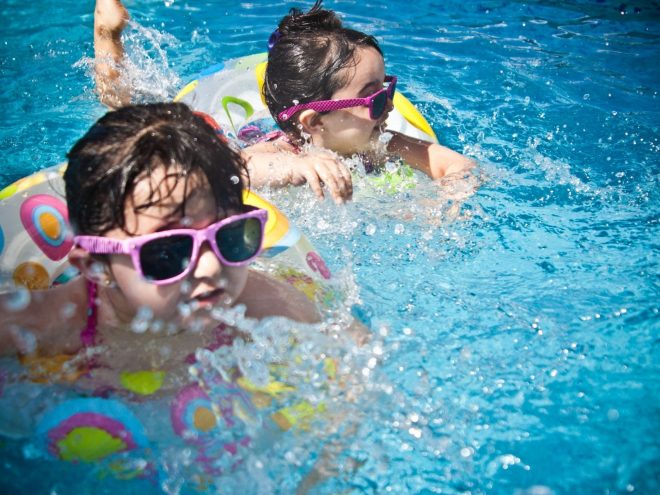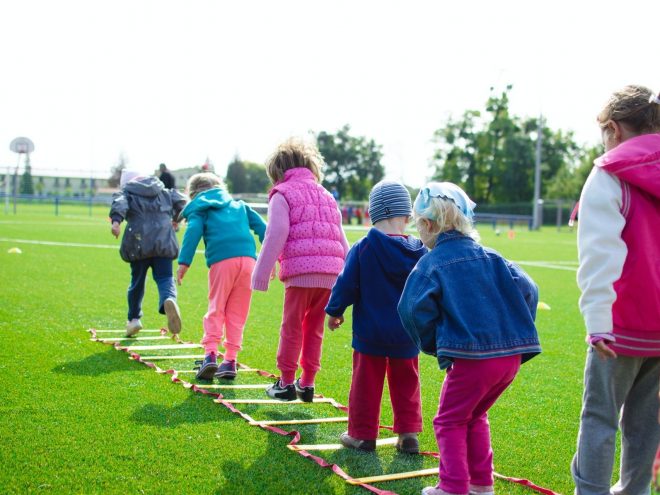Moms (and dads) of toddlers are pretty accustomed to a little person attached to their leg, hip or hands – sometimes all at the same time. They are used to being silly playmates, a horsey for riding, a booboo-kissing soother and a nighttime bedtime snuggler. But parents of toddlers also want, and need, their children to begin to develop independence and self-reliance. You want your children to be able to self-soothe, work through problems and finish daily chores and tasks by themselves. But the idea of fostering independence is also overwhelming. Maybe you feel like you aren’t ready to “let go” of your baby. Or maybe you try to encourage too much independence all at once, and it seriously backfires and your LO is as clingy as ever. Here are five easy ways to teach your toddler to be — more — independent:
Encourage Independent Play
Parents walk a fine line between providing security and encouraging dependence every day. While you may hover under the guise of making sure your daughter is safe, you’ve got to ask “Am I really just encouraging her to be dependent on me at all times?”Start with baby steps — no pun intended (okay – a little pun was intended). Sit nearby but don’t actively engage her in play time. Then you can move to another room while she plays, but, of course, make sure the play area doesn’t contain any safety hazards. While the solo play won’t last long, maybe only a matter of minutes, be sure to encourage and praise her.
Let Your Child Be Involved in the Morning Routine
There are plenty of books and songs out there that will help your little one get in the routine of brushing their teeth, but of course, nothing does it quite like leading by example. You can encourage your toddler to brush his teeth by bringing him to the bathroom when you take care of your chompers, and encourage a little monkey-see, monkey-do mimicking. Take him to the store to pick out the brush and toothpaste, and allow him to start out brushing. Then, until he has the skill down, step in for a few moments to get the tough-to-reach teeth. While you can’t rush this process since dental health is so important, you’ll be grateful to have a few free moments back once your toddler has mastered tooth brushing on his own.
Get Dressed Without Getting Stressed
A toddler isn’t going to be able to maneuver tiny snaps or tie up shoelaces yet, but there are age appropriate tasks they can do by themselves. Allow them to pick out their outfit (or choose from a few you’ve narrowed down) and allow them to pull up zippers and slip on shoes by themselves. Don’t stress if the shoes are on the wrong feet — instead praise her initiative, and help her get them on the correct feet. Also, look for pants with elastic waistbands so you don’t need to fuss with buttons or snaps until she is three or four.
Encourage Problem Solving
Older toddlers can get into a lot of trouble, and they need to begin to learn how to solve those problems. So when Cheerios inevitably spill all over your freshly swept kitchen floor, you may want to jump down to clean up the mess. But allow your child to clean up as well. When he wants to carry all five of his favorite toys outside, but can’t fit through the door, don’t lighten the load for him. Instead, let him work through it by making two trips or turning sideways to fit through the door. These little “problems” that spring up throughout the day are learning opportunities that will foster more independence. Look for signs that your child is taking on too much, like a change in behavior or a sharp increase in clinginess. Respect your child’s limits and don’t push for more independence than he is ready for.
Toy Around With Pairing Down Your Toys
Most parents lament the number of toys in their homes, so use this quest to raise an independent child as a reason to edit your toy collection. Stick with toys that can be used in a variety of ways, like blocks, a play kitchen, dolls, cars and trucks or even just cardboard boxes in the basement. Children can invent a million different scenarios using these toys, which will lead to longer independent play. Reducing the number of toys also prevents children from becoming overwhelmed. We’ve all invariably witnessed children who move quickly from one toy to the next, throwing every item out of their toy chest within minutes. By limiting the options, you prevent children from becoming overwhelmed and quickly distracted. Most toddlers simultaneously want to do things on their own and also want their parents around all of the time. It can be a confusing and frustrating phase of parenthood. By trying these simple ideas to teach independence your toddler can start becoming more of their own independent person — and you can get a little breather.





